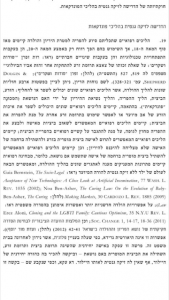Bridget J. Crawford recently spoke with Jennifer Weiss-Wolf of Period Equity, a non-profit organization located in New York City focused on all aspects of menstrual fairness. Ms. Weiss-Wolf is a self-described “writer, activist, feminist.” She is an advocate and frequent commentator on all things related to menstruation and public policy.
In this interview, Ms. Weiss-Wolf explains some of her work on behalf of menstrual equity and the relationship between law and social change.
Bridget Crawford: Your Period Equity colleague Laura Stausfeld described you “the most prolific and organized ‘menstrual equity’ advocate.” Can you explain what menstrual equity is?
Jennifer Weiss-Wolf: It is a term I concocted – and I am glad to see it taking hold! What I mean by menstrual equity is this: People who menstruate need affordable and accessible hygiene products to be fully equal players in society, to be productive students and citizens, and to be healthy. Addressing issues of menstruation – access, affordability, safety – is a matter of equitable treatment, even equitable representation in our government.
Crawford: Can you explain what you mean when you say menstruation is related to equitable representation in government?

Jennifer Weiss-Wolf
Weiss-Wolf: President Obama actually said it best when he was asked during a YouTube interview last January why he thought that menstrual products were not exempt from sales tax. His answer: “I suspect it’s because men were making the laws when those taxes were passed.” I basically agree. I don’t imagine there has ever been a secret or nefarious plot to purposefully exclude menstruation from policymaking. Rather, it is simply the outcome of too few women at the decision-making table – which, in turn, pretty much guarantees that our experiences are not fully reflected, nor our interests fully represented.
That said, though, stigma and marginalization are squarely part of the equation too. President-elect Donald Trump made incendiary comments about menstruation early in the campaign. When California Assembly Member Cristina Garcia introduced the tampon tax bill there in January 2016, she was nicknamed “Miss Menstruation.” When women are mocked for our biology – in an overt attempt to bully or quiet us down – the ability to promote policies that improve women’s lives is compromised.
Crawford: How did you first get involved in issues related to menstruation and public policy?
Weiss-Wolf: I can pinpoint the exact moment. It was New Year’s Day 2015 … at the Coney Island Polar Bear Club’s plunge. Each year my friends and I join hundreds of other New Yorkers crazy enough to charge into the icy Atlantic. That year we had even upped the ante and dressed up as Wonder Woman! After I got home and shook off all the sand and glitter – I did the natural next thing: posted my pictures on Facebook. And that was when I saw a post by a local parent that she and her daughters were leading a collection drive for tampons and pads to donate to our local food pantry. Their project was called “Girls Helping Girls. Period.”
I was floored that I’d never even considered this before. If periods are a hassle for me – an adult with the means to have a fully stocked supply of tampons and no inhibitions at all talking about it – it seemed nakedly, painfully obvious that for those who are poor, young, vulnerable, it could so easily be a real obstacle and problem. After some preliminary research I wrote an essay describing my reaction to this revelation that The New York Times published later that month. And there began the journey – literally, from Wonder Woman on the beach.
Crawford: Can you describe some of your early work on behalf of menstrual equity?
Weiss-Wolf: Right away I knew I wanted to address the issue from a policy perspective. Donation drives are crucial – they meet a need and engage the public – but, truly, I see this as a matter of societal and public obligation.
In terms of what would make a winning policy campaign, I zeroed in on the tampon tax. I knew that activists around the world were taking it on, and the time seemed ripe to do the same here in the U.S. It is a fairly straightforward public argument about equity and fairness that I thought would be popular and attract a wide audience.
In October 2015, I conceptualized and initiated the inaugural national tampon tax petition on change.org, and was thrilled when Cosmopolitan Magazine agreed to co-sponsor. My goal in creating a national petition was to ratchet up public attention to the issue in order to spur states to take action. It worked. By January 2016, President Obama weighed in, resulting in an avalanche of national media (that still hasn’t subsided). By March, I was called upon by Laura Strausfeld to assess and guide the public and media strategy vis-à-vis the filing of the class action lawsuit she conceptualized for New York State. In June, the American Medical Association issued a statement in support of legislation to eliminate the tampon tax. To date, the petition has more than 60,000 signatures and the advocacy campaign resulted in the introduction of legislation and/or public debate in 15 states during the 2016 session. The tax was eliminated in Connecticut, Illinois and New York, as well as the City of Chicago. The District of Columbia passed a bill last week to eliminate it (now awaiting the Mayor’s signature). California’s bill, passed unanimously in the legislature, was recently vetoed by Governor Brown. More states are poised to introduce and pass similar laws in 2017. Over the past year I provided research and support to lawmakers in states and cities across the country, including California, Illinois, Maryland, New York, Ohio, South Carolina, Virginia, Wisconsin, as well as Chicago, D.C. and New York City. I also testified and presented before several legislative bodies.
Crawford: Why do you think the issue of the tampon tax in particular captured the attention of popular press outlets like Cosmopolitan and Newsweek?
Weiss-Wolf: The issue has the benefit of being interesting, under-reported (well, until the past year) and essential to the lives and well-being of half the population! Add in a dose of stigma-busting (and therefore headline-grabbing) and you have a winning combination.
A central component of my advocacy strategy has been to elevate the national discourse around menstrual equity policy – not only as a way to eradicate stigma and educate the public about the plight of those who lack access, but also to motivate legislators to act and ensure they know the public will is on the side of these laws. For example, I write a weekly update for a curated list of media contacts and work closely with many editors and reporters to ensure coverage that is accurate, compelling, timely and effective. I also lend my own voice to the public arena with public writing and have published around 20 op-eds in outlets including Newsweek and Cosmo – as well as The New York Times, TIME, The Nation, Bloomberg, Bustle and Ms. Magazine, among others. [See Ms. Weiss-Wolf’s website here for links to her op-eds and other writings. -ed.]
At the close of 2015, NPR coined the oft-quoted term “The Year of the Period,” noting that the number of times the word menstruation was mentioned by national news outlets more than tripled from 2010 to 2015. Cosmo named 2015 “The Year the Period Went Public.” As you mention, in April 2016, for the first time ever, Newsweek featured period activism as a cover story. These are among the many hundreds of high-profile headlines and hits over the past year on the policy aspect of this work.
Crawford: You played a role in the New York City Council’s decision to make menstrual hygiene products available in jails, homeless shelters and public schools. How did that come about? Continue reading →




 The idea that constitutions are gendered is not new, but its recognition is the product of a revolution in thinking that began in the last decades of the twentieth century. As a field, it is attracting scholarly attention and influencing practice around the world. This timely Handbook features contributions from leading pioneers and younger scholars, applying a gendered lens to constitution-making and design, constitutional practice and citizenship, and constitutional challenges to gender equality rights and values.
The idea that constitutions are gendered is not new, but its recognition is the product of a revolution in thinking that began in the last decades of the twentieth century. As a field, it is attracting scholarly attention and influencing practice around the world. This timely Handbook features contributions from leading pioneers and younger scholars, applying a gendered lens to constitution-making and design, constitutional practice and citizenship, and constitutional challenges to gender equality rights and values. In 1984, the United States started down a path towards the criminalization of domestic violence that it has steadfastly continued to follow. The turn to the criminal legal system to address domestic violence coincided with the rise of mass incarceration in the United States. Levels of incarceration have increased by five times during the life of the anti-domestic violence movement. The United States incarcerates approximately 2.2 million people, with another 5 million under the scrutiny of parole and probation officers. While the criminalization of domestic violence did not have “a significant causal role” in the increase in mass incarceration in the United States, scholars have argued that the turn to criminal law to address domestic violence has contributed to the phenomenon of mass incarceration. Given the current focus on overcriminalization and decreasing mass incarceration, the time may be ripe to consider alternatives to criminalization of intimate partner violence. In her 2007 article, The Feminist War on Crime, law professor Aya Gruber wrote, “Although I am skeptical about the ability of criminal law to solve social inequality problems, there may be good reasons to keep domestic violence crimes solidly on the books.” Professors Cecelia Klingele, Michael Scott and Walter Dickey have called for the development of scholarship addressing “crime problems for which arrest, prosecution, and conviction are the most appropriate responses to crime, along with instances in which invocation of traditional response is particularly fruitless or counterproductive.” Both generally and specifically in the context of intimate partner violence, these articles ask about the continued utility of criminal interventions. This article takes up those questions and asks: should domestic violence be decriminalized?
In 1984, the United States started down a path towards the criminalization of domestic violence that it has steadfastly continued to follow. The turn to the criminal legal system to address domestic violence coincided with the rise of mass incarceration in the United States. Levels of incarceration have increased by five times during the life of the anti-domestic violence movement. The United States incarcerates approximately 2.2 million people, with another 5 million under the scrutiny of parole and probation officers. While the criminalization of domestic violence did not have “a significant causal role” in the increase in mass incarceration in the United States, scholars have argued that the turn to criminal law to address domestic violence has contributed to the phenomenon of mass incarceration. Given the current focus on overcriminalization and decreasing mass incarceration, the time may be ripe to consider alternatives to criminalization of intimate partner violence. In her 2007 article, The Feminist War on Crime, law professor Aya Gruber wrote, “Although I am skeptical about the ability of criminal law to solve social inequality problems, there may be good reasons to keep domestic violence crimes solidly on the books.” Professors Cecelia Klingele, Michael Scott and Walter Dickey have called for the development of scholarship addressing “crime problems for which arrest, prosecution, and conviction are the most appropriate responses to crime, along with instances in which invocation of traditional response is particularly fruitless or counterproductive.” Both generally and specifically in the context of intimate partner violence, these articles ask about the continued utility of criminal interventions. This article takes up those questions and asks: should domestic violence be decriminalized? Joan Meier (GW) has posted to SSRN her article,
Joan Meier (GW) has posted to SSRN her article,  This Article identifies and offers solutions to an emerging problem in family law: same-sex divorce. The Article’s central claim is that parties to the first wave of same-sex divorces are not effectively bargaining against the backdrop of legal dissolution rules that would govern in the absence of an agreement. In other words, to use Robert Mnookin and Lewis Kornhauser’s terminology, they are not “bargaining in the shadow of the law.” Instead, the Article argues, many same-sex couples today bargain in the shadow of a myth that same-sex couples are egalitarian—that there are no vulnerable parties or power differentials in same-sex divorce. The Article shows how the myth of egalitarianism undermines current bargaining for same-sex divorce. First, the myth leads to what the Article calls divorce exceptionalism, that is when a party claims that existing marriage dissolution rules do not apply in same-sex divorce because they were designed to remedy the non-egalitarian conditions of different-sex marriages. Divorce exceptionalism disables effective bargaining because without default legal rules there is nothing to guide the bargaining process. Second, the myth of egalitarianism eliminates key bargaining chips: under a presumption of formal equality neither party really has anything to “give” or “get” in the bargain for divorce. Finally, the myth, combined with the general fog of uncertainty regarding how courts will treat same-sex divorces, may lead to increased strategic behavior. The Article proposes a realistic solution, arguing that the legal actors who participate in same-sex divorce, including lawyers, mediators, courts, and the parties themselves, should reject divorce exceptionalism and apply ordinary divorce rules. It also proposes to protect vulnerable parties by extending to same-sex divorce the current trend towards joint-custody presumptions. The myth of egalitarianism in same-sex couples, which was quite helpful in achieving marriage-equality, is now haunting the first wave of same-sex divorces and harming vulnerable parties. It is time to let the myth go and address the reality of same-sex marriage and divorce.
This Article identifies and offers solutions to an emerging problem in family law: same-sex divorce. The Article’s central claim is that parties to the first wave of same-sex divorces are not effectively bargaining against the backdrop of legal dissolution rules that would govern in the absence of an agreement. In other words, to use Robert Mnookin and Lewis Kornhauser’s terminology, they are not “bargaining in the shadow of the law.” Instead, the Article argues, many same-sex couples today bargain in the shadow of a myth that same-sex couples are egalitarian—that there are no vulnerable parties or power differentials in same-sex divorce. The Article shows how the myth of egalitarianism undermines current bargaining for same-sex divorce. First, the myth leads to what the Article calls divorce exceptionalism, that is when a party claims that existing marriage dissolution rules do not apply in same-sex divorce because they were designed to remedy the non-egalitarian conditions of different-sex marriages. Divorce exceptionalism disables effective bargaining because without default legal rules there is nothing to guide the bargaining process. Second, the myth of egalitarianism eliminates key bargaining chips: under a presumption of formal equality neither party really has anything to “give” or “get” in the bargain for divorce. Finally, the myth, combined with the general fog of uncertainty regarding how courts will treat same-sex divorces, may lead to increased strategic behavior. The Article proposes a realistic solution, arguing that the legal actors who participate in same-sex divorce, including lawyers, mediators, courts, and the parties themselves, should reject divorce exceptionalism and apply ordinary divorce rules. It also proposes to protect vulnerable parties by extending to same-sex divorce the current trend towards joint-custody presumptions. The myth of egalitarianism in same-sex couples, which was quite helpful in achieving marriage-equality, is now haunting the first wave of same-sex divorces and harming vulnerable parties. It is time to let the myth go and address the reality of same-sex marriage and divorce.


 In Fisher v. University of Texas in June 2016, the Supreme Court upheld the use of race-conscious affirmative action in college admissions. While recognizing a university’s interest in the educational benefits that derive from a diverse student body, Justice Kennedy cautioned in the majority opinion: “A university’s goals cannot be elusory or amorphous — they must be sufficiently measurable to permit judicial scrutiny of the policies adopted to reach them.”
In Fisher v. University of Texas in June 2016, the Supreme Court upheld the use of race-conscious affirmative action in college admissions. While recognizing a university’s interest in the educational benefits that derive from a diverse student body, Justice Kennedy cautioned in the majority opinion: “A university’s goals cannot be elusory or amorphous — they must be sufficiently measurable to permit judicial scrutiny of the policies adopted to reach them.” The Northern/Irish Feminist Judgments Project inaugurates a fresh dialogue on gender, legal judgment, judicial power and national identity in Ireland and Northern Ireland. Through a process of judicial re-imagining, the project takes account of the peculiarly Northern/Irish concerns in shaping gender through judicial practice. This collection, following on from feminist judgments projects in Canada, England and Australia takes the feminist judging methodology in challenging new directions. This book collects 26 rewritten judgments, covering a range of substantive areas. As well as opinions from appellate courts, the book includes fi rst instance decisions and a fi ctional review of a Tribunal of Inquiry. Each feminist judgment is accompanied by a commentary putting the case in its social context and explaining the original decision. The book also includes introductory chapters examining the project methodology, constructions of national identity, theoretical and conceptual issues pertaining to feminist judging, and the legal context of both jurisdictions. The book, shines a light on past and future possibilities – and limitations – for judgment on the island of Ireland.
The Northern/Irish Feminist Judgments Project inaugurates a fresh dialogue on gender, legal judgment, judicial power and national identity in Ireland and Northern Ireland. Through a process of judicial re-imagining, the project takes account of the peculiarly Northern/Irish concerns in shaping gender through judicial practice. This collection, following on from feminist judgments projects in Canada, England and Australia takes the feminist judging methodology in challenging new directions. This book collects 26 rewritten judgments, covering a range of substantive areas. As well as opinions from appellate courts, the book includes fi rst instance decisions and a fi ctional review of a Tribunal of Inquiry. Each feminist judgment is accompanied by a commentary putting the case in its social context and explaining the original decision. The book also includes introductory chapters examining the project methodology, constructions of national identity, theoretical and conceptual issues pertaining to feminist judging, and the legal context of both jurisdictions. The book, shines a light on past and future possibilities – and limitations – for judgment on the island of Ireland.
